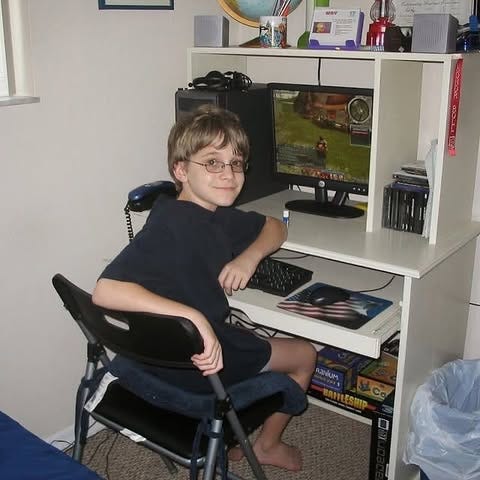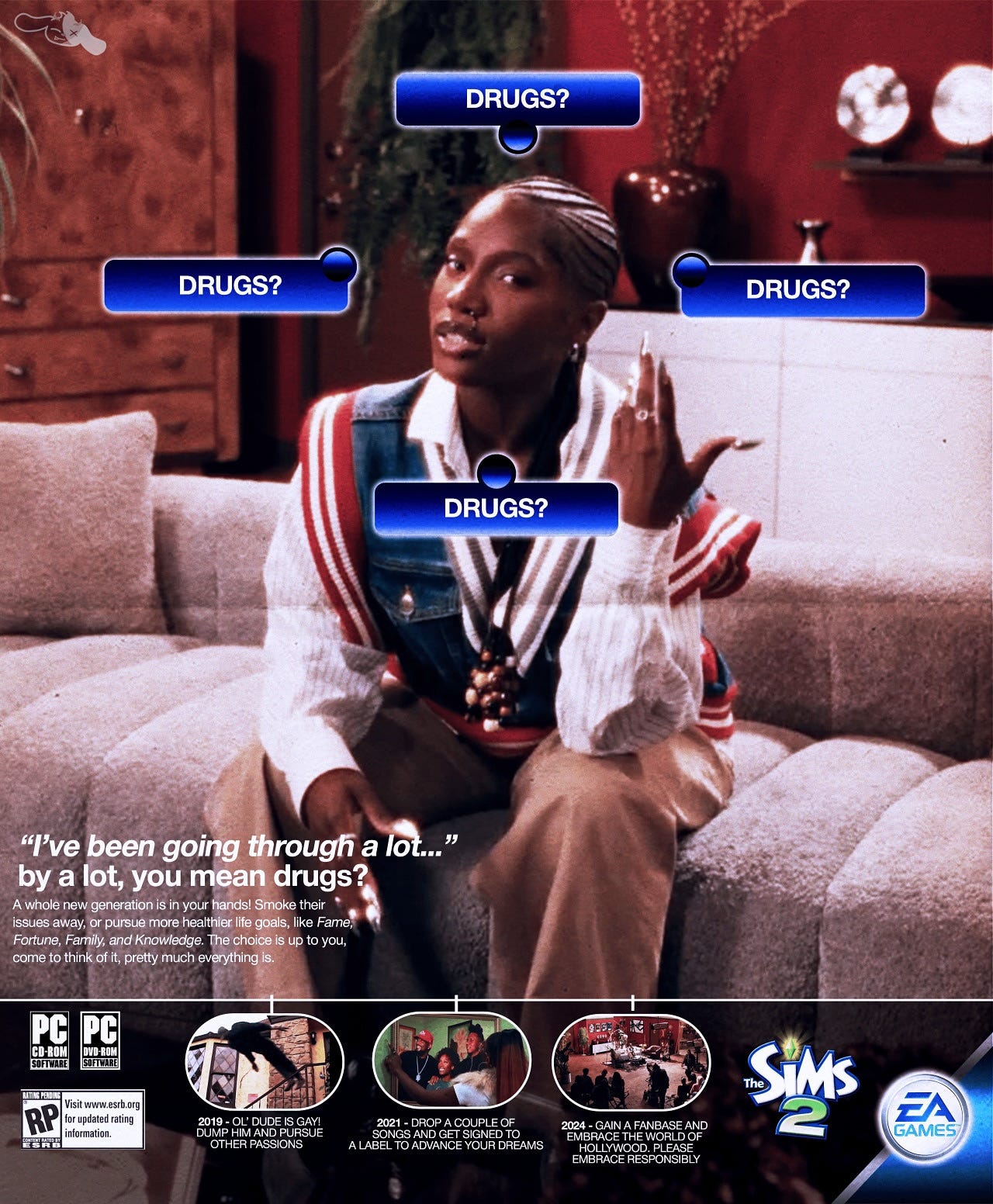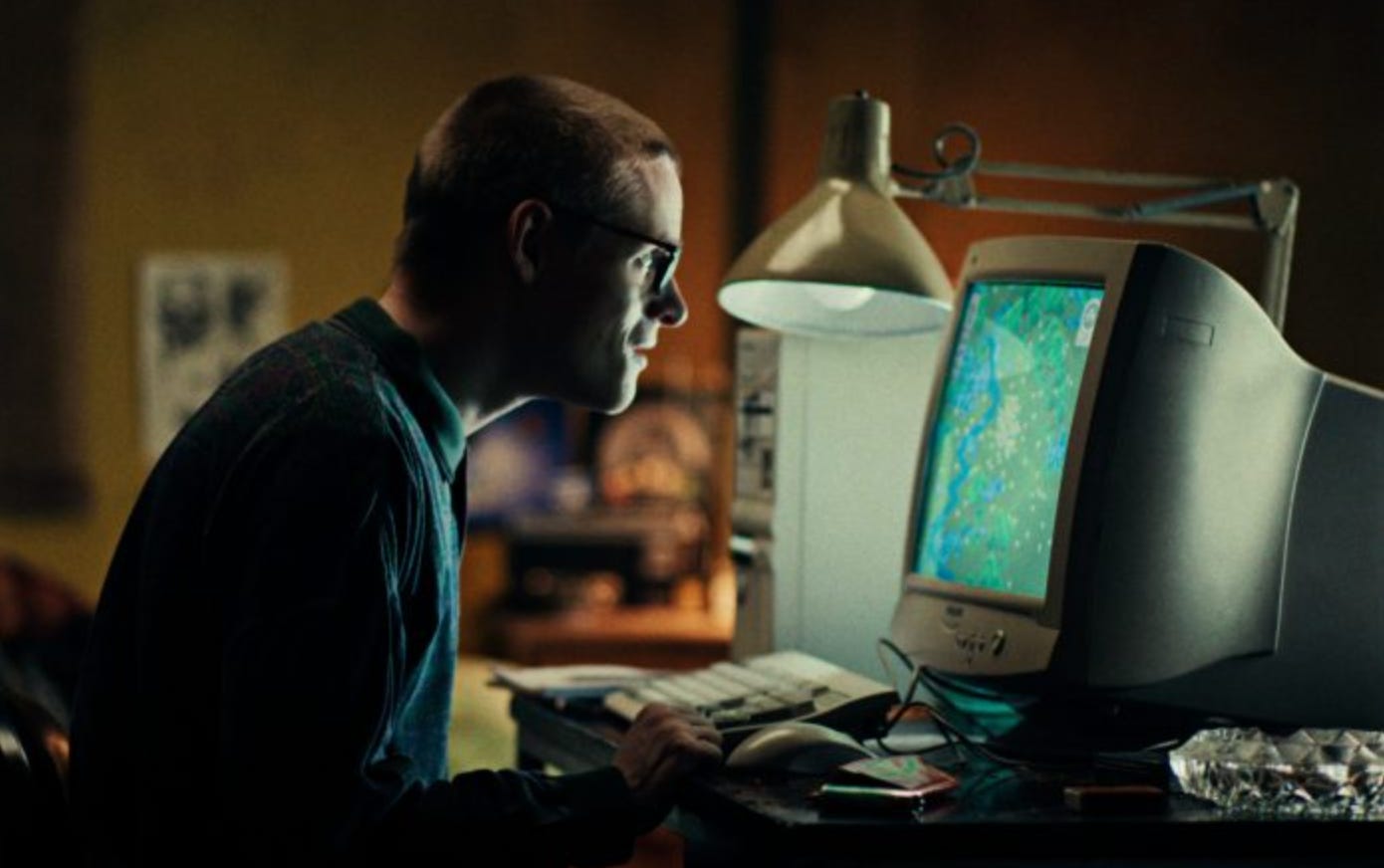MØRNING. For years, retro internet visuals have popped-up in every corner of pop culture. Now, though, it's the hardware, rather than the software, that's getting us misty-eyed. From nostalgic Instagram carousels to Coperni's LAN party, the clunky 'family computer' is making a comeback. For this week’s newsletter, Kyle MacNeill decodes the shift…
There was something powerfully tactile about the shared computer. We made time to sit down, listen to the boot-up sounds, log in and surf with purpose, plonking ourselves on a spinny chair for a few hours of escapism on The Sims or MSN. To “go on the computer” was a verb (and a desperate request from us to our parents).
No wonder, then, we’re getting sentimental about it. A wave of art has recently represented the PC in a positive light, tapping into its past aura. Family Computer, for example – a recently-published risograph zine by artist Allison NB – reminisces about our time spent surfing together. Earlier this month, American artist Nicole Nikolich transformed The Delaware Contemporary gallery into a computer room, complete with crocheted video game screens and a PC centrepiece. Similarly, MSCHF’s latest installation featured a desktop being rained on and the widely reposted Coperni show at Paris Fashion Week invited the fashion elite to a LAN party.
In the world of TV, Severance has also made us appreciate the clinical style of clunky computer cubicles. And on Instagram, dreamy carousels of old desktops are triggering fond memories of sitting at them. Of course, for some of us who still use them at work or for high-speed gaming, this isn’t a total throwback. But, for the majority of us, the desktop has long been in terminal decline; only 37.4% of people in the UK own one and that figure’s only going to go down as the years go on.
It’s true that the use of retro PC graphics in popular culture is nothing new; vaporwave was built on the stuff and, as noted by Noah Jordan for welcome.jpeg recently, we’re returning to early virtual aesthetics through music videos, ads and Grand Theft Auto Instagram filters.
But there’s a simultaneous shift in focus from the software to the hardware. Now, we’re waxing lyrical about the computer as a physical thing rather than just a conduit to the internet. “The medium is the message,” as Marshall McLuhan so iconically noted in the ‘60s, chimes strongly here; the object is more meaningful than the content it conveys.
Continuing McLuhan’s punning on the word “message” (his other books changed it to “mass age”, “mess age” and “massage”) perhaps part of the desktop computer’s reboot is down to us living in a “miss age”. Nostalgia, as Mark Fisher predicted, has never been more potent. We can’t stop longing for the past – and increasingly, even the very recent past, via the “nowstalgia” of rapid-cycling trends – at the expense of creating something genuinely novel.
It’s the same story with tech; its lifespan has never been shorter. The pathway from innovation to obsoletion has been minimised to the extreme, forcing us to upgrade more rapidly. Cutting-edge devices quickly become old news. Even smart watches already feel schlocky.
But device revivals have, equally, never been closer in time to their original demise; the trend cycle has never revolved more rapidly. The obsolete can quickly become innovative again – not in terms of function, but in terms of its cultural cachet. It’s why we’re already making outdated iPhones coveted, pining for late-2000s pop and rediscovering our lost Tamagotchis. Soon, we’ll be seeing Meta AI glasses through rose-tinted ones. Actually, maybe not.
When it comes to the shared computer, there are genuinely fond memories attached. Crucially, it takes us back to a time of navigating the internet in an intentional way. Where our access point to the cybernet was fixed, rather than portable. And our trips into the ether were meaningful, not habitual.
In these less halcyon days, we try to make time, often in vain, to log off – offline social clubs have never been more in vogue. But almost every digital detox ends in relapse, because the online world is with us everywhere we go, a dark cloud hanging above us. The internet is inescapable.
Of course, the desktop wasn’t without its faults. Aside from it being the precursor to Big Tech, it kept us indoors, staring at bluelight, the gateway drug to full on screen addiction. We swapped actual experience for XP, beautiful views for Vista. Just this month, new Black Mirror episode “Plaything” depicted the ‘90s desktop as something that could harbour alien life (via the super cute, meeping Thronglets).
But, for the most part, our nostalgia is based on the fact that the computer is far less sinister than, say, the increasingly omniscient smartphone. The content was less hardcore, the interface less clinical, the purpose less dystopian. And, crucially, the connection was greater; we didn’t scroll in silence but huddled around it at home, surfing together.
And ultimately, the personal computer’s threat has dissipated. We understand its limitations; it’s now a portal to the past rather than the future. It’s docile, obedient, innocent; an endearingly outdated droid with good intentions that takes us back to being a kid. Unlike AI, there is no risk of our old Dell making us obsolete. It’s just a reminder of when life was so much simpler.
As Emma Garland noted in her most recent newsletter for Huck, the impossibly oafish Donald Trump counterintuitively hit the nail on the head when he recently quipped “everything is computer” while ogling the inside of a Tesla. “He's right. Everything is computer,” Garland wrote, noting that our “fear of technology”, incessant state of being "tired and alienated" and “sickly feeling” after scrolling too much on TikTok shows that “computer” — as a hijacked adjective — can describe so much of life.
It makes sense, then, that if “everything is computer” we’re keen to return to The Computer. The source of it all; the first internet-connected machine that spawned so many others. The master copy.
That’s all for this week readers!
Words by Kyle MacNeill. Cover image by Reddit r/wow. Edited by Sui Donovan and Shadeh Kavousian. Brought to you by @morning.fyi.








Love the comment on early PC Graphics. Low poly aesthetics (think PS1/N64) have been particularly huge over the last year: https://www.drawndistant.com/p/in-2024-low-poly-graphics-were-everywhere
amazing !! "complaim aout the way other people make software making software" Andre Torrez.